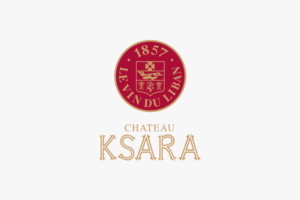From its founding in 1857, Château Ksara Estate lives and grows through the core values of tradition, nobility, and modernity. As the country’s oldest winery, they have made it their mission to continue their unique, centuries-old practice of viticulture and winemaking, by following the steps of the Jesuits founders and implementing innovative processes, to face contemporary challenges like climate change.
DID YOU KNOW?
When Jesuits first came to Lebanon they focused on scientific studies of climatology, and established the first observatory of the Middle East at Ksara in 1911. This Observatory, was equipped for studies on meteorology, seismology and astronomy. Therefore, the oldest meteorology data available in the region are those recorded in Ksara since 1911. These valuable data show cast the evolution of rain precipitation and temperatures recorded over the past century. They are clear evidence of a trend towards higher temperatures levels and a change in rain precipitation form causing less snow on mountains which acts like a natural water reserve for the Beqaa. These climate changes have been amplified during the past 15 years.
WHAT’S THE INNOVATION?
Starting 2016, Château Ksara generalized the implementation of probes by introducing 45 new ones around the Bekaa, capable of precisely measuring the humidity of the soil.
Probes were introduced at different depth underground: 50 cm, 80 cm, and 120 cm. This allowed them to understand better the soil water retention of their vineyards. Indeed, the hydraulic state of the vine is crucial for its good health. Water constraints have positive effects on the vine specially for black grapes varieties, but a water stress could have bad lasting effects on the health of the vine. Therefor, this technology allows Château Ksara to evaluate the exact need in water to avoid any hydraulic stress.
Situated on a seismic area, between Mont Lebanon and Anti Lebanon, the Bekaa is characterized by its microclimates and diversity of soil. This is why probes were dispatched on different vineyards on the plateau. They were introduced on different parcels of the same vineyards, which is important when planning for plantations as the inclination and structure of the soil plays a big role in water drainage and evaporation causing disproportion in water repartition.
Probes were introduced in Ksara, Tel el Deir and Mansoura vineyards.
WHAT’S THE STORY BEHIND THE INNOVATION?
The vulnerability of the Bekaa towards climate change. Indeed , Château Ksara is threatened of draught in the Bekaa, and expertise in water management is crucial for a sustainable agriculture. Therefor, Château Ksara have invested in tools for data collection, precise irrigation systems and a waste water treatment system in order to optimize the use of water in the vineyard and at the winery.
WHY IS IT IMPORTANT?
The Bekaa is rich in water but water should not be used extensively! Extensive use of water in agriculture is common in the Bekaa and is lowering the level of underground water due to the lack of control and planning of this area. This technology, is giving Château Ksara a better understanding on the water retention of the soil, while giving information on the optimal amount of water needed by the plant, and the optimal timing to irrigate, hence an optimization in the use of water for a sustainable agriculture.



